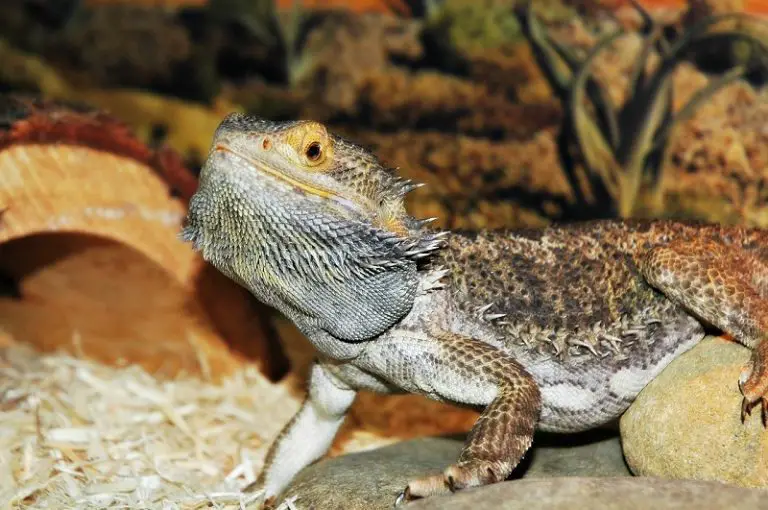What Can Bearded Dragons Eat: A Comprehensive Guide
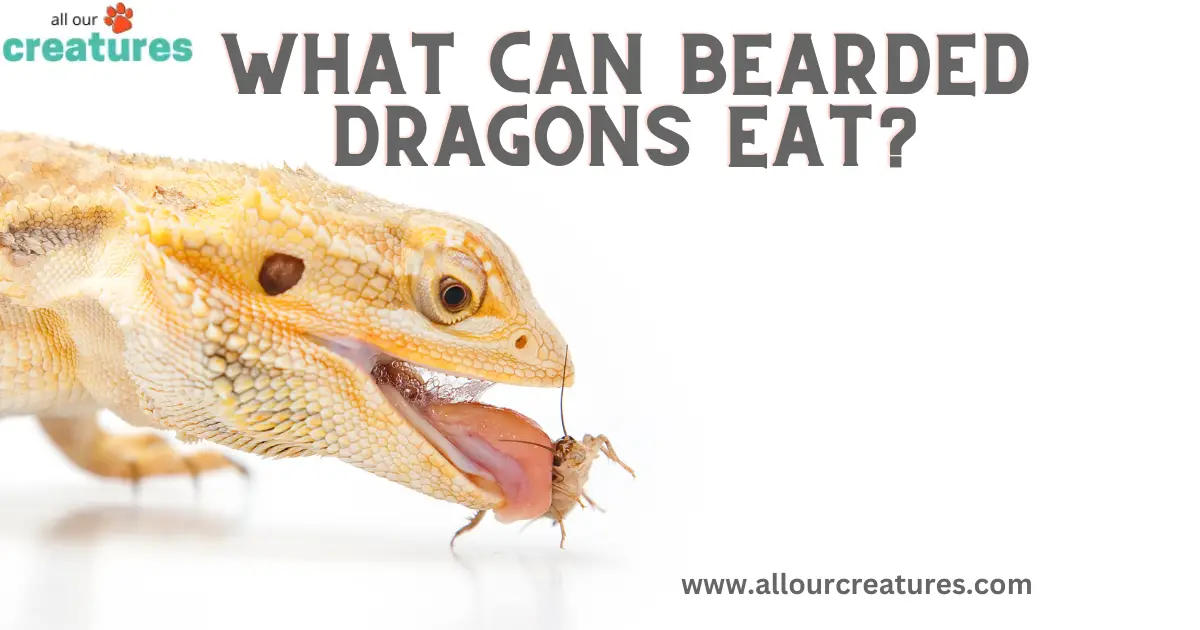
Wondering what your bearded dragon can munch on? Look no further! Our comprehensive guide on “What Can Bearded Dragons Eat” has got you covered. We’ll dive into all the delicious and nutritious foods that your scaly friend can enjoy. From tasty insects to colorful fruits and veggies, we’ll help you create a well-rounded diet that will keep your bearded dragon happy and healthy. Let’s get started!
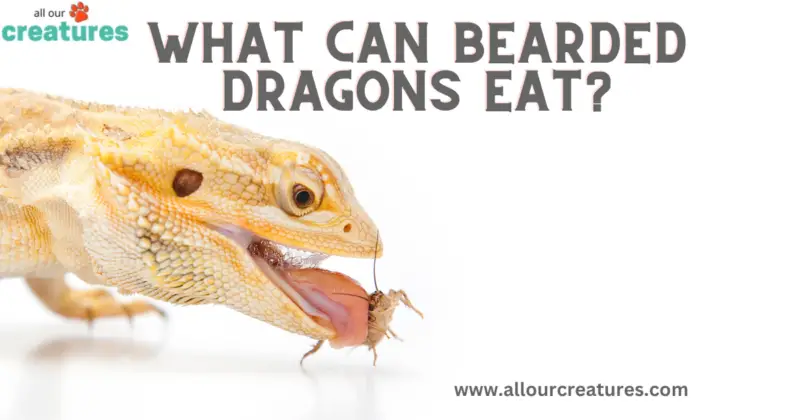
Contents
Table of Contents
What can bearded dragons eat?
Bearded dragons have a diverse diet consisting of both insects and plant matter. Their diet should primarily consist of gut-loaded insects such as crickets, mealworms, and dubia roaches. They also require a variety of vegetables and fruits, including leafy greens, squash, bell peppers, and berries. It’s important to provide a balanced and nutritious diet to ensure the health and well-being of your bearded dragon. Avoid feeding them toxic or harmful foods such as avocados, rhubarb, and citrus fruits.
What Can Bearded Dragons Eat: Ultimate Guide
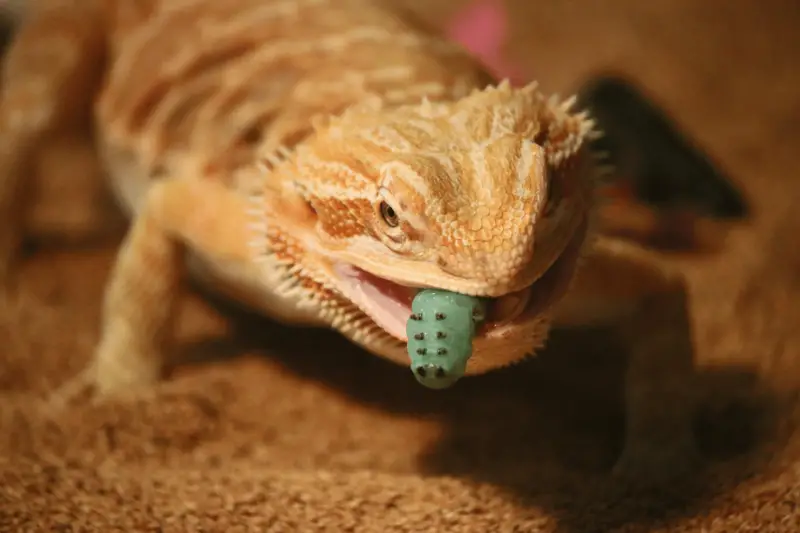
Bearded dragons are popular pets thanks to their unique appearance and friendly nature. As reptile enthusiasts know, providing proper nutrition is crucial for ensuring the health and well-being of these fascinating creatures. When it comes to feeding your bearded dragon, variety is key, as they require a balanced diet consisting of vegetables, fruits, insects, and other protein sources.
Understanding the variety of foods bearded dragons can eat is essential for maintaining their overall health. When it comes to vegetables, options like collard greens, kale, and watercress are excellent choices for your beardie’s daily diet. Fruits like peeled apples, strawberries, and figs serve as delicious treats and dietary supplements.
For protein, live insects and small vertebrates should be integrated into their daily meals depending on their developmental stage. As you explore the various food options, it is important to avoid certain foods that may be harmful to your bearded dragon, such as avocado and rhubarb.
Providing a diverse and balanced diet is essential to ensuring your bearded dragon lives a healthy and happy life. Familiarizing yourself with the array of safe and nutritious food options will keep your pet both satisfied and thriving.
Bearded Dragons Dietary Needs
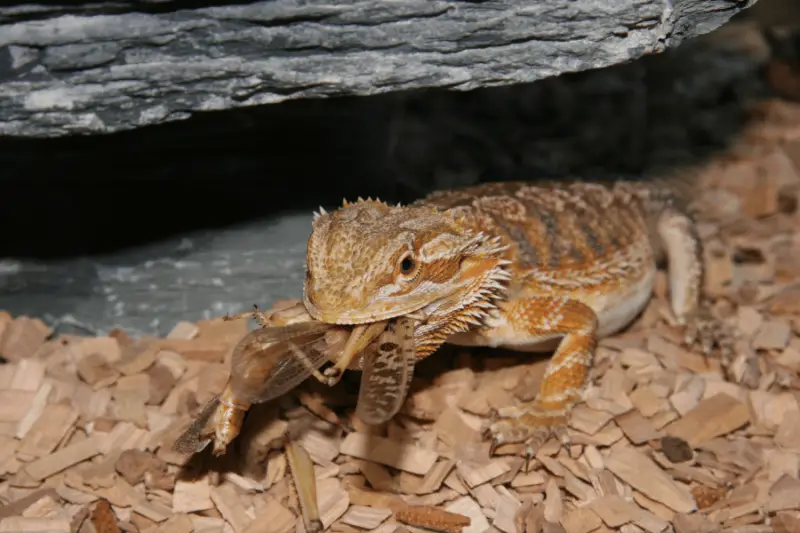
Omnivores
Bearded dragons are omnivores, which means they eat both animal and plant-based foods. Their diet typically consists of vegetables, insects, and non-citrus fruit. A variety of options within these categories should be provided to ensure proper nutrition.
Vitamins and Minerals
Vitamins and minerals are essential for a bearded dragon’s health. Calcium is especially important for bone health and growth. Calcium supplements should be added to their food, especially for young bearded dragons. Vitamins A, D, and E are also vital for their well-being.
Nutrition
A well-balanced bearded dragon diet should include:
- Insects, such as crickets, mealworms, and dubia roaches
- Leafy greens, like collard greens and mustard greens
- Vegetables, such as carrots, zucchini, and green beans
- Occasional fruit treats
Remember to offer a mix of live protein sources, greens, and fruits to ensure that your bearded dragon receives proper nutrients. The ratio of protein to plant-based foods will change as the bearded dragon ages.
Balanced Diet
Create a balanced diet for your bearded dragon by considering its age and size. As a general guideline:
- Baby bearded dragons: Aim for a diet breakdown of 80% feeders and 20% vegetables
- Juvenile bearded dragons: An ideal ratio is 50% protein, 30% vegetables, and 20% fruit
- Adult bearded dragons: Protein can be reduced to 40%, while vegetables and fruit can make up 50% and 10%, respectively
Feeding Frequency
Feeding frequency also depends on the age of your bearded dragon:
- Baby bearded dragons: Feed 3-4 times a day, with a higher percentage of protein
- Juvenile bearded dragons: Feed 2-3 times a day
- Adult bearded dragons: Feed once every 1-2 days
Keep in mind that these are guidelines, and individual bearded dragons may have slightly different dietary requirements. Monitor the health and growth of your bearded dragon, and adjust their diet as needed to ensure optimal nutrition.
Safe Greens and Vegetables
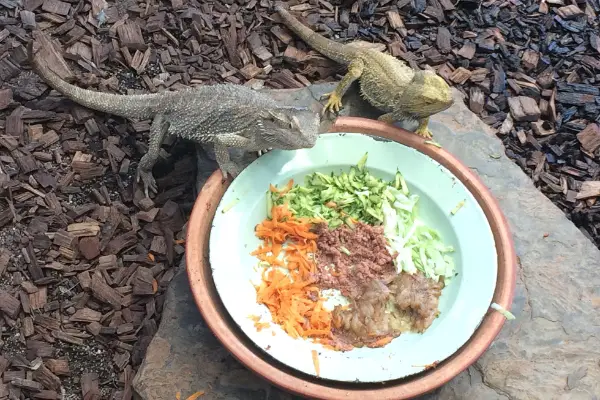
Bearded dragons thrive on a diverse diet, including various greens and vegetables. Incorporating these items in their diet provides essential nutrients, vitamins, and minerals for your pet’s growth and overall health.
Some top choices for leafy greens include:
- Collard greens: Rich in fiber, vitamins A, C, E, and K, while having a low sugar and calorie content. This green also has a good balance of calcium to phosphorus, important for maintaining a strong, healthy body.
- Dandelion greens: High in calcium and vitamins A, C, and K, this green is not only safe but also beneficial for bearded dragons.
- Mustard greens: Similar to dandelion greens, they provide a high-calcium and low-calorie option for your beardie’s diet.
- Turnip greens: Another leafy green with a high-calcium content, suitable for daily feeding.
In addition to leafy greens, other vegetables can provide variety and essential nutrients in a bearded dragon’s diet. Some suggested vegetables include:
- Kale: Packed with vitamins A, C, and K, potassium, manganese, magnesium, and calcium, kale is a low-oxalate option that can be fed occasionally.
- Cabbage: While slightly goitrogenic, which could affect thyroid function if fed too often, it can still be part of a balanced diet.
- Escarole: Rich in vitamins and minerals, it is a valuable addition to the mix of greens and vegetables.
- Endive: Another good source of vitamins and fiber, and can be fed regularly to your beardie.
- Bok choy: High in calcium, it can be offered occasionally to provide variety in the diet.
When preparing these greens and vegetables for your bearded dragon, ensure they are cut into appropriate sizes to avoid digestion issues and impaction. Consider mixing different types of greens, vegetables, and even some fruits for a more diverse and balanced diet.
Safe Food Guide For Bearded Dragons | Vegetables, Fruits, and Bugs
Healthy Fruits
Bearded dragons can enjoy a variety of fruits as part of their balanced diet. It’s essential to offer these fruits in moderation and with a mix of other food types like vegetables and insects. Here are some healthy fruit options to consider for your bearded dragon:
- Apples: Both green and red apples are generally safe for bearded dragons; however, they must be fed in moderation due to their high sugar content. Remove the seeds and skin before serving, as they can be harmful.
- Berries: Bearded dragons can eat different types of berries, including strawberries, blueberries, and raspberries. They offer various vitamins and minerals but should be fed in moderation due to their sugar content. Remember to chop larger berries into smaller pieces for easier consumption.
- Melons: Melons and watermelons can provide vitamins A, C, potassium, and phosphorus in your bearded dragon’s diet. However, due to their high water and sugar content, they should be fed sparingly. Remove any seeds, and cut the rind off before serving.
- Mango: Mangoes are rich in vitamins A and C, making them a nutritious fruit option for bearded dragons. Make sure to remove the skin and seed, and cut the fruit into small pieces to prevent choking hazards.
- Kiwi: Kiwis are another healthy fruit choice for bearded dragons, packed with vitamins C, K, and E. Ensure to peel off the skin, remove the seeds, and chop the fruit into small pieces before feeding.
It’s essential to remember that while fruits provide valuable nutrients, too much sugar can lead to health problems like obesity and diabetes in bearded dragons. Therefore, fruits should be fed as an occasional treat, complementing a balanced diet of vegetables and insects. Always research a new fruit before offering it to your bearded dragon and consult with a veterinarian if required.
Recommended Insects
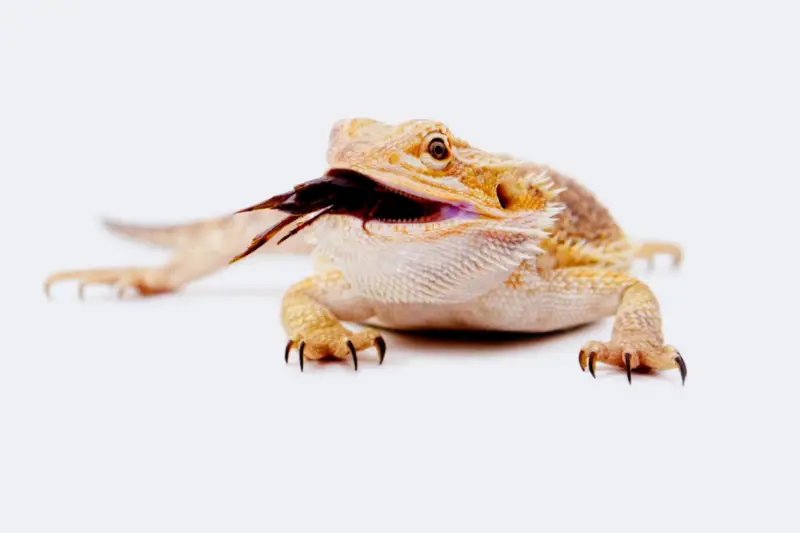
Bearded dragons are omnivorous creatures, which means they can eat both plant-based and animal-based foods. Insects form an essential part of their diet, providing them with the necessary proteins, vitamins, and minerals they need for optimal health. Here, we will discuss some of the best insects to include in a bearded dragon’s diet.
- Crickets: A popular choice among bearded dragon owners, crickets are rich in nutrients and provide a good source of protein. They are also relatively easy to find and maintain as feeder insects. Ensure you provide crickets that are appropriately sized for your bearded dragon.
- Roaches: Roaches, especially Dubia roaches, are one of the best staple insects to feed a bearded dragon. They are rich in protein, low in fat content, and provide a variety of valuable nutrients. Additionally, they come in different sizes suitable for bearded dragons at various life stages.
- Black Soldier Fly Larvae: These larvae, also known as Phoenix worms, are a great source of protein and calcium for bearded dragons. They help promote healthy bone growth and are easy to digest.
- Silkworms: Silkworms provide an excellent source of protein, calcium, and other essential nutrients for bearded dragons. They are also soft-bodied, making them easy for your bearded dragon to digest.
- Earthworms: Although not as nutritionally dense as other options, earthworms can still be a beneficial treat for bearded dragons. They contain protein, vitamins, and minerals, but should not be the primary insect in their diet.
- Wax Worms: Wax worms are high in fat, making them a suitable treat for bearded dragons on occasion. However, due to their high fat content, they should not be used as a staple food source.
- Super Worms: These worms, also known as king worms or morio worms, are packed with protein and nutrients, making them an ideal food for bearded dragons. They can be served as a treat or a supplemental food source.
Remember always to gut-load your insects before feeding them to your bearded dragon. Gut-loading is the process of feeding insects with nutrient-dense foods, which in turn enhances their nutritional value. Additionally, dusting insects with calcium powder before feeding is essential to maintain your bearded dragon’s bone health.
Offering a variety of insects in your bearded dragon’s diet is crucial to ensure they receive all the nutrients they need. Be cautious of wild-caught insects, as they may contain pesticides or parasites harmful to your pet. Stick to the recommended insects listed above to provide a balanced diet and keep your bearded dragon healthy and thriving.
Foods to Avoid
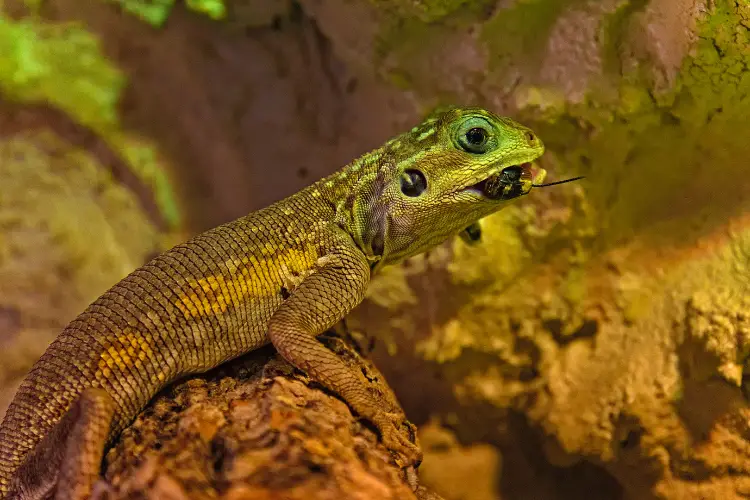
When creating a well-balanced diet for your bearded dragon, it is essential to know which foods to avoid. In this section, we’ll cover toxic foods, high oxalate foods, high phosphorus foods, and high fat foods that you should avoid feeding your bearded dragon.
Toxic Foods
There are several toxic foods that can be harmful, or even fatal, to your bearded dragon. Some of these include:
- Avocado: toxic to bearded dragons and can cause various health issues, including heart problems.
- Rhubarb: the leaves and stem of the rhubarb plant contain high levels of oxalates, which are toxic to bearded dragons.
- Fireflies or lightning bugs: deadly to bearded dragons, as they can cause seizures and death.
Additionally, some fruits like oranges, tomatoes, lemons, limes, grapefruit, pineapple, and tangerines should never be fed or given rarely due to their high acidity. Also, avoid feeding your bearded dragon the seeds of apples, cherries, apricots, and peaches, as these seeds contain cyanide, which is toxic to reptiles.
High Oxalate Foods
Bearded dragons should not consume foods high in oxalates, as they can bind to calcium and inhibit its absorption. This can lead to calcium deficiency and other health issues. Foods high in oxalates include:
- Spinach
- Beet greens
- Swiss chard
- Purslane
High Phosphorus Foods
Bearded dragons require a calcium-to-phosphorus ratio of 2:1 in their diet to maintain proper bone health. Foods with high phosphorus content can disrupt this balance, leading to calcium deficiency and metabolic bone disease. Some high phosphorus foods to avoid are:
- Broccoli
- Cauliflower
- Cabbage
- Kale
- Peas
High Fat Foods
A diet high in fat can lead to weight gain and other health problems for bearded dragons. Certain high-fat foods should not be included in the diet of a bearded dragon, such as:
- Butter
- Cheese
- Fatty meats, like pork
In summary, carefully select the food items you introduce to your bearded dragon’s diet to ensure they maintain optimal health. Avoid toxic foods as well as those high in oxalates, phosphorus, and fat.
Feeding Baby and Juvenile Bearded Dragons
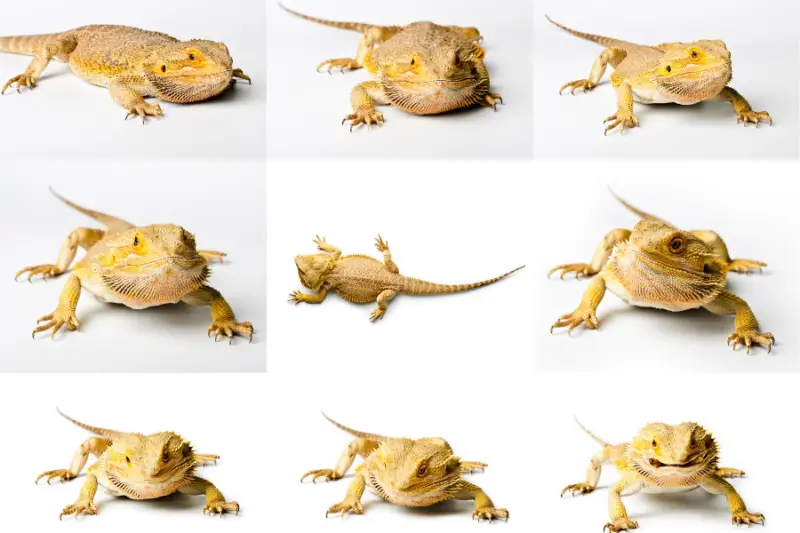
Baby and juvenile bearded dragons have different dietary requirements as they grow and develop. To ensure the proper growth and health of your bearded dragons, it’s essential to provide a balanced diet consisting of insects, vegetables, and supplements.
Baby Bearded Dragon Diet
Baby bearded dragons, up to the age of 6 months, require a diet that is high in protein. Insects such as pinhead crickets, small dubia roaches, and black soldier fly larvae make great prey food for babies. Greens should also be included in their diet, with options like kale, collard greens, and dandelion greens being suitable choices.
To support their growth and development, it’s crucial to dust their food with vitamin and calcium powder.
Here’s a simple feeding guideline for baby bearded dragons:
- 80% insects, 20% greens
- Feed 3-4 times daily
Juvenile Bearded Dragon Diet
As your bearded dragon ages, their dietary requirements change. Juvenile bearded dragons, aged between 6-18 months, will start to consume more greens and less insects in their diet. Their feeding frequency should also be reduced, as overfeeding can lead to weight gain and negatively impact their health.
Here’s a general guideline for juvenile bearded dragon feeding:
- 60-70% insects, 30-40% greens
- Feed 1-3 times daily
Some of the greens and vegetables that can be fed to your bearded dragons include:
- Sprouts
- Escarole
- Watercress
- Parsley
- Green beans
- Kale
- Carrots
- Collard greens
- Asparagus
- Cabbage
- Cooked lentils
- Various types of squash
- Peas
For both baby and juvenile bearded dragons, it’s essential to dust their food with calcium 4-5 times a week and vitamin D3 or a multivitamin containing vitamin D3 two times a week.
Remember to avoid feeding your bearded dragon harmful or toxic foods, such as avocado and rhubarb, and steer clear of processed human foods. By following these guidelines and providing a balanced diet, you can ensure the healthy growth of your baby and juvenile bearded dragons.
Feeding Adult Bearded Dragons
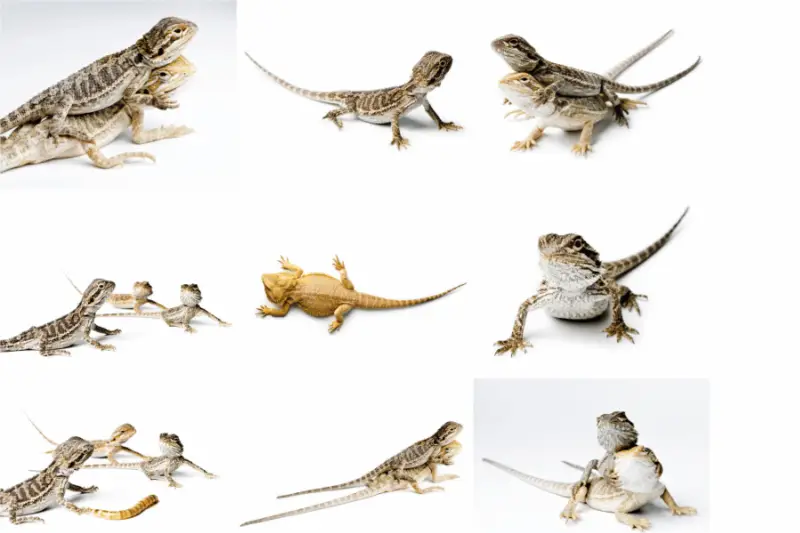
As adult bearded dragons transition from being insect-heavy omnivores to herbivores, their diet significantly changes. It is crucial to ensure a balanced diet for your bearded dragons, with the right mix of insects, vegetables, and occasionally, fruit.
Adult bearded dragons require a diet that consists of 80% vegetables and 20% insects. Choose a variety of vegetables and greens to provide your dragon with all the necessary nutrients. Some appropriate choices include:
- Collard greens
- Mustard greens
- Dandelion greens
- Squash
- Bell peppers
- Kale
- Cucumber
- Zucchini
- Carrots
Insects can be fed once or twice a week, including:
- Dubia roaches
- Crickets
- Super worms
- Hornworms
- Mealworms
- Waxworms
It is essential to avoid feeding your bearded dragon insects caught from the wild, as these may carry diseases or parasites that can harm your pet. Always opt for purchasing insects from a reputable pet store or breeder.
Adult bearded dragons should be fed once a day, providing enough food to last them around 15-20 minutes. Make sure to adjust the quantity to prevent overfeeding or underfeeding.
In terms of maintenance, be sure to provide a large, clean enclosure for your bearded dragon, with appropriate heat and lighting. Temperatures in the enclosure should range from 95-110°F within the basking spot, with cooler temperatures of around 80-90°F elsewhere. Regularly clean your bearded dragon’s enclosure and provide fresh water daily to maintain their health and well-being.
By following these recommendations, you can ensure your adult bearded dragon receives a balanced diet and prospers in a well-maintained environment.
Water and Hydration

Bearded dragons need to stay hydrated for their overall health and well-being. Providing water for them can be more complex than just filling up a bowl and leaving it in their enclosure. Here, we will discuss a few techniques for ensuring proper hydration in bearded dragons.
One of the ways bearded dragons drink water is by licking surfaces with water droplets, such as leaves and rocks in their natural habitat. In captivity, you can mimic this by spraying or misting your bearded dragon’s enclosure, allowing them to lap up the water droplets off surfaces.
Another natural method bearded dragons use to consume water is by lapping up raindrops during rainfall. You can simulate this by lightly misting water on your bearded dragon, and it will slowly lap at the water dripping from its nose.
Many bearded dragon owners offer a shallow water bowl in their enclosures for hydration. However, some beardies might ignore their water bowl and instead, prefer to drink from their bathwater. Ensure that the bathwater is clean and free from soaps or detergents.
In addition to providing water through these methods, it is essential to maintain a balanced diet for bearded dragons. Their diet as babies should consist of 80% insects and 20% vegetation, as they can obtain some hydration from the moisture in their food.
In summary, bearded dragons require proper hydration, which can be provided through misting, drinking from water bowls, and consuming moisture-rich foods. Monitoring your pet’s water intake and offering a variety of hydration options will help ensure their health and well-being.
Supplements and Calcium
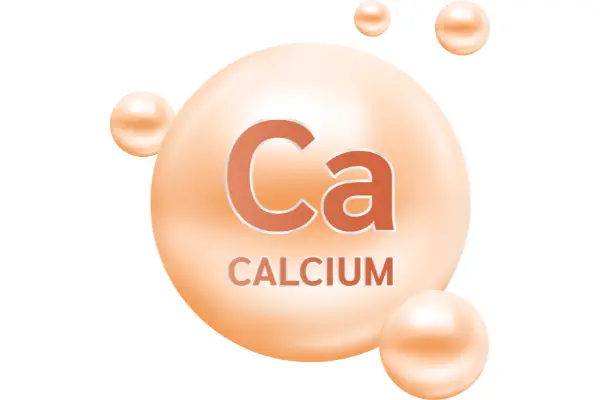
Bearded dragons require a well-balanced diet that includes calcium and vitamin D3 to support their overall health and prevent metabolic bone disease. In the wild, bearded dragons primarily obtain these nutrients through their diet and exposure to sunlight. However, in captivity, providing suitable supplements is necessary to ensure they receive the right calcium and vitamin D3 balance.
Some great sources of calcium for bearded dragons include leafy greens such as collard greens, dandelion leaves, mustard greens, and turnip greens. In addition to these, other calcium-rich foods include:
- Cactus pad (prickly pear)
- Endive or escarole
- Kale
- Rosemary
- Grape leaves
- Blackberries
- Figs
- Papaya
- Squash
- Sweet potatoes
To further enhance the calcium content in their diet, it is recommended to use calcium powder supplements. These can be easily added to their food by dusting it on their insects, vegetables, or fruits. Calcium supplements should be provided based on your bearded dragon’s age and developmental stage. Growing beardies should receive calcium dustings every other day or 2-3x a week, while adults can have them once a week.
In addition to calcium, bearded dragons need vitamin D3 to help them effectively absorb and utilize calcium in their bodies. Combining calcium supplements with vitamin D3 further supports their bone health and can help prevent deficiencies that may lead to metabolic bone disease.
Bearded dragons can receive vitamin D3 naturally from exposure to UVB light in their enclosure or from sunbathing outside. Providing a quality UVB light source within their tank can significantly improve their calcium absorption and overall health.
Maintaining the correct balance of calcium and vitamin D3 is vital for your bearded dragon’s health. Continuous monitoring and adjustment of their calcium and vitamin D3 intake can help keep your bearded dragon healthy and prevent deficiencies or imbalances that could lead to potential health issues.
Conclusion: What Can Bearded Dragons Eat

Bearded dragons are omnivores, which means they can consume a diverse range of plant-based and animal-based foods. A balanced diet for a bearded dragon should include insects, vegetables, and fruits. To promote their well-being, it is essential to understand the types of food they can consume and adapt their diet accordingly.
Adult bearded dragons require a diet composed of 70% leafy greens, 20% colored veggies or fruits, and 10% insects. However, bear in mind that young bearded dragons need a higher proportion of insects in their diet, gradually shifting towards more plant-based foods as they grow.
When considering which fruits and vegetables to feed your bearded dragon, always remember to avoid fruits with high amounts of sugar or vegetables with too much oxalic acid, which can cause health issues. Further, foods like avocado or rhubarb should be entirely avoided due to their toxicity to these reptiles.
Monitor your bearded dragon’s appetite and health; each individual might have specific preferences or needs. Providing them with a varied and balanced diet will ultimately lead to a happier and healthier pet.

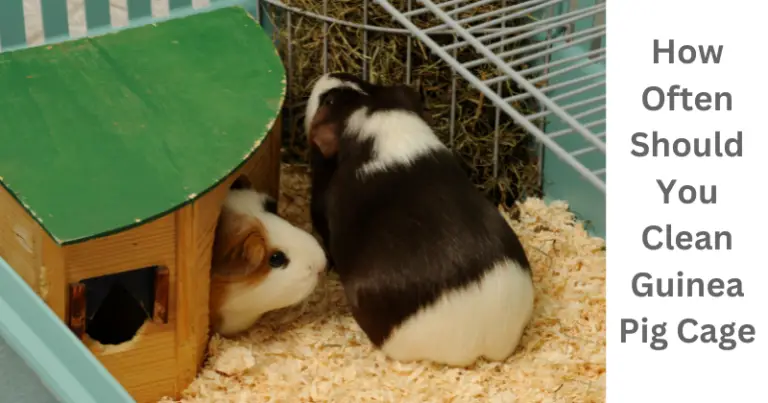
![How Many Mealworms To Feed A Bearded Dragon? [Read Now]](https://allourcreatures.com/wp-content/uploads/2021/10/How-Many-Mealworms-To-Feed-A-Bearded-Dragon-2.jpg)
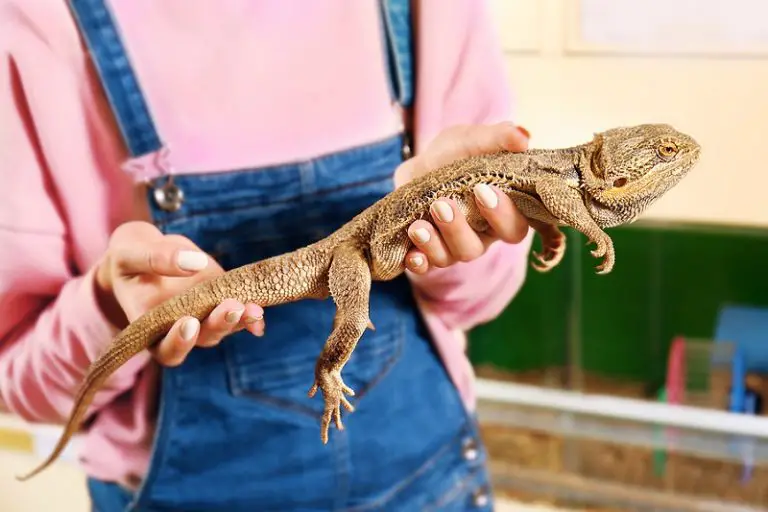
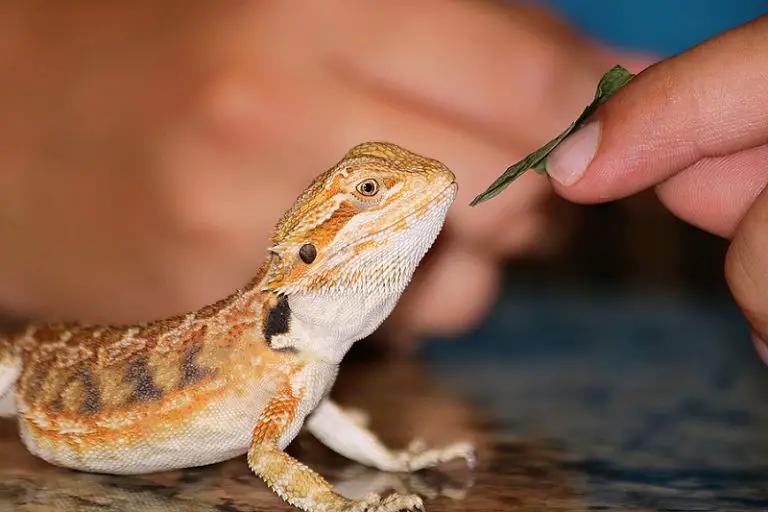
![Best Insects For Bearded Dragons [Must Read]](https://allourcreatures.com/wp-content/uploads/2021/10/bigstock-A-Bearded-Dragon-pogona-Sp-E-412949071-768x512.jpg)
